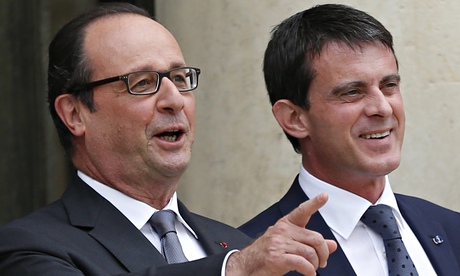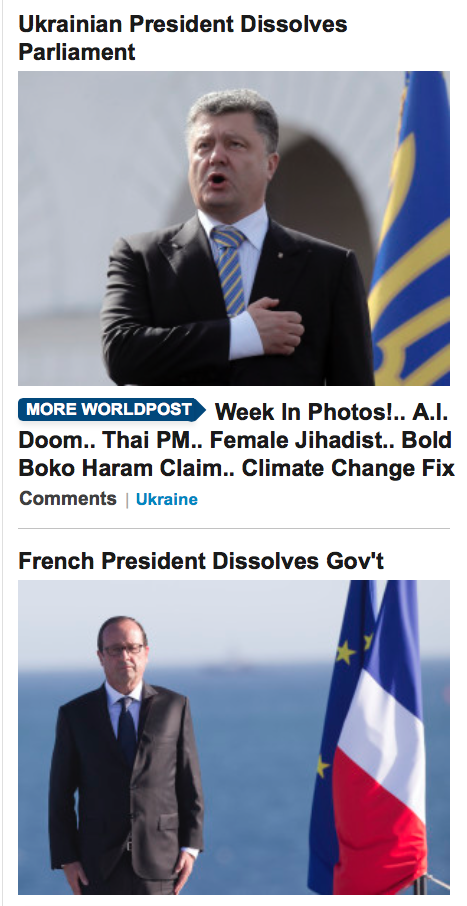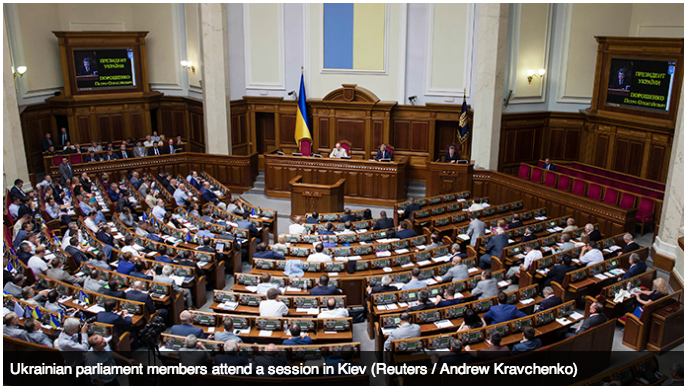Ukraine President dissolves parliament, paves way for early election
RT.com
Ukrainian president, Petro Poroshenko, has made the decision to dismiss the country’s parliament, the Verkhovna Rada, a message on his official Twitter account says.
The decision comes because “the majority of the MPs voted for dictator-style laws,” which cost the lives of Maidan activists, RIA Novosti news agency reports citing Poroshenko’s spokesman.
The election of the new parliament will be held on October 26, the spokesman Svyatoslav Tsegolko wrote on his Facebook page.
Poroshenko has called on “democratic forces” in Ukraine to enter the elections as a united “pro-Ukrainian, pro-European team,” Tsegolko’s Facebook post states adding that the Rada was dismissed “because it is the only right and responsible decision.”
“The Fifth Column in the parliament consists of dozens of so-called people’s deputies. But they don’t represent the interests of the people, who elected them, but the interests of some other people,” the statement said.
Neither Poroshenko’s nor the Verkhovna Rada’s official websites contain any messages giving details. However, the official Twitter account of the President’s Administration also states the one-chamber parliament is dismissed.
Poroshenko, who came to power in Ukraine on June 7, declared his intention to hold early parliamentary elections in his inauguration speech before the Rada.
In late July, following the resignation of the government, Ukraine’s ruling coalition of nationalist Svoboda (Freedom) party and the Udar (Strike) party dissolved itself enhancing the prospects for an early vote. On August 2, Poroshenko again spoke of a snap parliamentary election after the Rada refused to recognize the self-proclaimed Lugansk and Donetsk People’s Republics as terrorist groups. Back then he also labeled the deputies as a “Fifth Column,” saying that he doesn’t know how to work with such a parliament. The term “Fifth Column” originates from the Spanish Civil War of 1936-39 where Franco’s fascists literally sent a “fifth column” of spies and provocateurs to try to capture capital Madrid from inside the city. ~~~~~~~~~~~~~~~~~~~~~~~~~~~~~~~~~~~~~~~~~~~~~~~~~~~~~~~~~~~~~~~
France thrown into political turmoil after government dissolved
PM Manuel Valls told to form new government after minister’s call to end austerity policies imposed by Germany triggers crisis

France has entered uncharted political waters after the prime minister, Manuel Valls, presented his government’s resignation amid a political crisis triggered by his maverick economy minister who called for an end to austerity policies imposed by Germany.
The prime minister, a social democrat who has been compared to Tony Blair, acted with characteristic swiftness in a bid to reassert his authority. His aides had let it be known on Sunday that the economy minister, Arnaud Montebourg, had crossed a “yellow line” for his dual crime of criticising both the president of France and a valued ally.
Montebourg, 51, fired his first broadside in an interview with Le Monde on Saturday and followed up with a speech to a Socialist party rally the following day. In a veiled reference to President François Hollande, he said that conformism was an enemy and “my enemy is governing”. “France is a free country which shouldn’t be aligning itself with the obsessions of the German right,” he said, urging a “just and sane resistance”.
He was joined in his criticism by the education minister Benoit Hamon, who on Monday denied that he had been disloyal. A third minister, Aurélie Filipetti, also appeared in danger of losing her job after wishing a “good day” on Twitter to her two dissident colleagues.
Hollande, who is politically weakened with his approval rating at an all-time low of 17%, asked Valls to form a new government “consistent with the direction set for the country”, which is expected to be announced on Tuesday. Valls has pledged to stick to a course in which deficits would be cut while the tax burden on businesses would be eased, bringing him into conflict with the left wing of the party represented by Montebourg. The changes have not yet been carried out, unemployment is at nearly 11% and growth in 2014 is forecast to be only 0.5%.
Now, with the fragmentation of the left bursting into the open, Montebourg is scheduled to deliver a speech later on Monday.
Centre-right politicians had called for the economy minister to step down, while some Socialists recognised that it was illogical for an economy minister to attack his own government’s economic policies. The National Front is demanding the dissolution of parliament.
The challenge for Valls will be to put together a government that can win the approval of the national assembly, despite the revolt by the Socialist party’s left flank and desertion by the ecologists.
“We can’t rule out the government being thrown out by a majority in parliament, and the president would have to envisage a dissolution of the assembly,” constitutional expert Dominique Rousseau told Libération. “The crisis is not over, it’s just beginning.”
Analysts said that Valls was likely to keep Hollande loyalists in the cabinet, including the finance minister, Michel Sapin, the agriculture minister, Stephane Le Foll, and the defence minister, Yves Le Drian. But the justice minister, Christiane Taubira, could be among those to pay the price of falling out with Valls.
It remains to be seen whether Valls, who became prime minister in March, will be allowed more leeway in forming his new government, compared with the outgoing cabinet that reflected the internal contradictions of Hollande himself. Le Parisien reported on Monday that he had said to Hollande “it’s him or me”, referring to Montebourg.
The crisis is unfolding as politicians already have an eye on the next presidential elections in 2017. Montebourg may now see himself as the flag-bearer of the left, while Valls until now has remained popular in the country as a whole although his popularity ratings have also shrunk.
The centre-right UMP is also in crisis, however. Former president Nicolas Sarkozy has not yet announced whether he intends to run although he is widely expected to do so. But former prime minister Alain Juppé, now mayor of Bordeaux, and former agriculture minister Bruno Lemaire have said in the past few days that they would take part in a primary.

